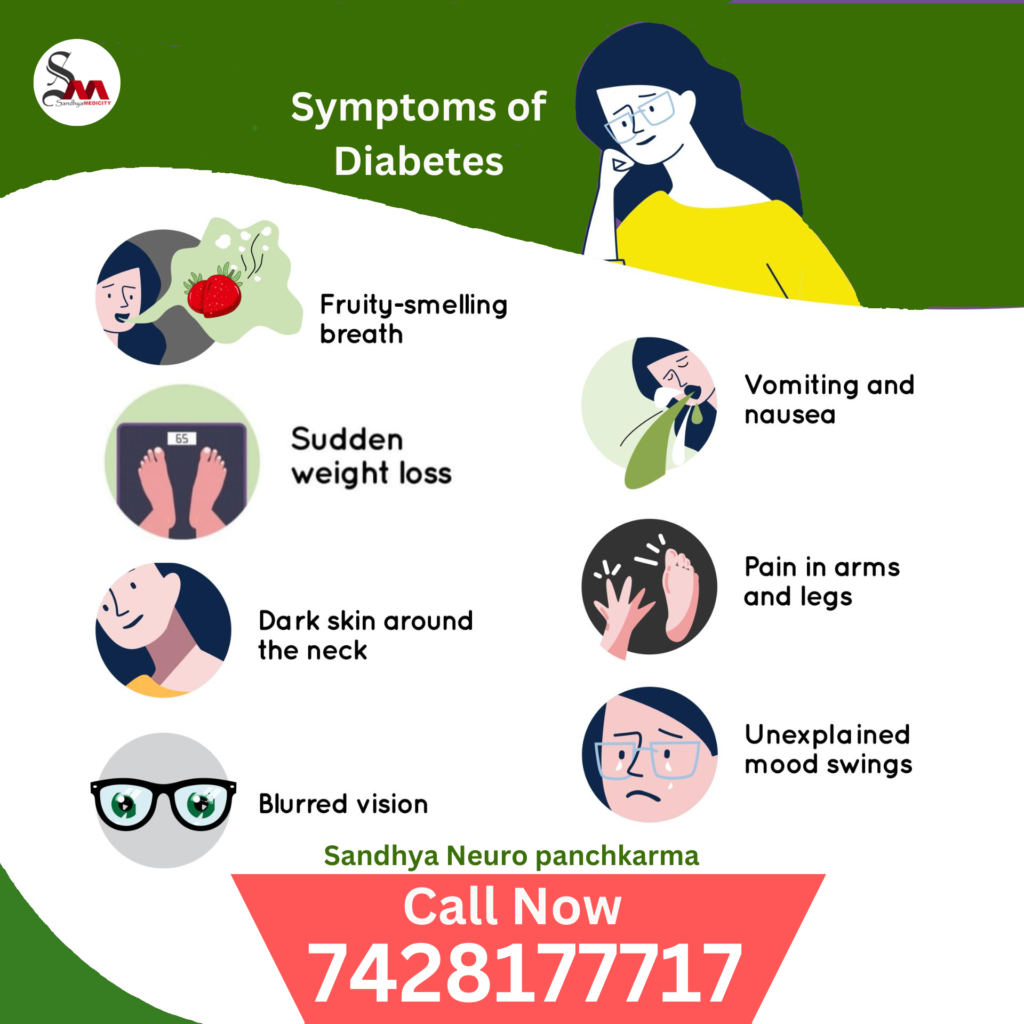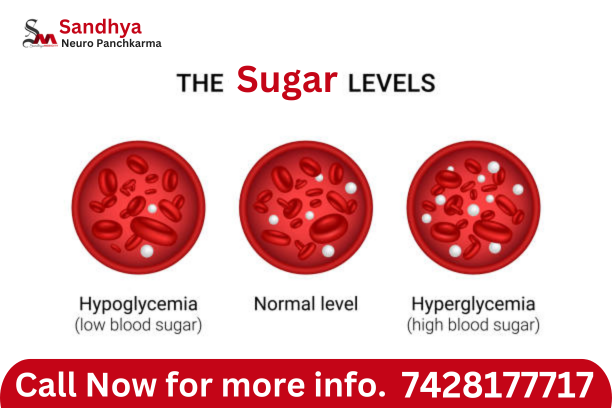Diabetes in Ayurveda Treatment – Now, let’s dive into the world of Ayurveda – an ancient Indian approach to healing that focuses on balance and harmony within the body. Ayurveda sees health as a delicate balance between mind, body, and spirit. So, when it comes to diabetes, Ayurveda aims to restore this balance and help you find your sweet spot, quite literally!

Diabetes in Ayurvedic Terms
- Emphasize foods with bitter and astringent tastes.
- Include whole grains, green vegetables, and herbs like bitter melon in the diet.
- Avoid or minimize the intake of sweet, oily, and heavy foods.
- Lifestyle Recommendations
- Regular physical activity is encouraged to enhance metabolism and balance doshas.
- Stress management through practices like yoga and meditation is important.
- Adequate sleep and maintaining a regular routine are emphasized.
- Herbal Remedies
- Ayurvedic herbs such as bitter melon (Momordica charantia), neem (Azadirachta indica), gudmar (Gymnema sylvestre), and turmeric (Curcuma longa) are commonly used.
- Herbal formulations prescribed by Ayurvedic practitioners may vary based on an individual’s constitution and specific imbalances.
Symptoms of Diabetes
- · Signs of Diabetes in Ayurveda
If you find yourself making more trips to the bathroom than usual, it might be time to consider if diabetes is at play. Excess sugar in the blood can lead to increased urine production, causing you to feel like you’re living in a perpetual line at the restroom.
- · Increased Thirst and Hunger
All that extra peeing can make you feel pretty parched, which is why excessive thirst is a common symptom of diabetes. In addition, since your body isn’t effectively using the sugar in your blood, you may experience constant hunger, even if you’ve just eaten a horse-sized meal.
- · Unexplained Weight Loss for diabetes in Ayurveda
While weight loss might sound like a blessing in disguise, if you haven’t been trying to shed those pounds, it could be a red flag for diabetes. The body’s inability to properly process sugar can cause it to turn to alternative energy sources, like muscle and fat, leading to unwanted weight loss.
- · Fatigue and Weakness
Feeling perpetually tired and weak, even after a solid 8 hours of beauty sleep? Diabetes might be crashing your energy levels. Without enough insulin to help transport sugar to your cells, they aren’t getting the energy they need to keep you powering through the day.
- Mood Swings and Irritability
Diabetes can sometimes affect your emotional well-being, turning you into a rollercoaster of emotions. Blood sugar fluctuations can trigger mood swings, leaving you feeling irritable, agitated, or even anxious. Keep in mind that it’s not just you; it’s the diabetes talking!
- · Anxiety and Depression
Diabetes and mental health often go hand in hand. The constant vigilance over blood sugar levels, dietary restrictions, and the fear of complications can contribute to feelings of anxiety and depression. It’s essential to prioritize your mental well-being alongside managing your physical health.
- · Cognitive Impairment and Memory Issues
Forgetfulness and difficulty concentrating can be frustrating symptoms of diabetes. High blood sugar levels can impact cognitive function, potentially impairing memory and hindering your ability to focus. So, the next time you can’t find your car keys, don’t blame it solely on old age; diabetes might be playing a part too!

Types of Diabetes
Diabetes comes in different flavors, just like ice cream (except this is a flavor you don’t want). The two main types are Type 1 and Type 2 diabetes in Ayurveda.
- Type 1
diabetes in Ayurveda is like an unwelcome surprise party thrown by your immune system. It mistakenly attacks the cells in your pancreas that produce insulin, the hormone responsible for regulating blood sugar. Without insulin, your blood sugar levels can go haywire.
- Type 2
On the other hand, diabetes in Ayurveda is more like a slow and steady invasion of your body’s insulin production. Here, your body either becomes resistant to the effects of insulin or doesn’t produce enough of it. It’s often linked to lifestyle factors, such as poor diet and lack of exercise. But hey, don’t blame the donuts just yet.
- · Pre-diabetes
Pre-diabetes is a condition that occurs before the onset of type 2 diabetes. It’s a wake-up call from your body, warning you that your blood sugar levels are higher than normal but not yet in the diabetic range. Think of it as a yellow traffic light, signaling you to slow down and take action to prevent diabetes from developing.
blood sugar levels
Sugar, oh sweet sugar! We all love it, whether it comes in the form of a decadent dessert or a sneaky spoonful in our coffee. But let’s get scientific for a moment. When we talk about sugar levels, we’re mainly referring to glucose, which is a molecule that serves as fuel for our cells. Glucose can come from the carbohydrates we eat, and our bodies work hard to regulate its levels.
- Abnormal Sugar Levels
Ah, the havoc that abnormal sugar levels can wreak! When sugar levels go too low (hypoglycemia) or too high (hyperglycemia), it can lead to a rollercoaster of symptoms. These can range from irritability and dizziness to more serious issues like confusion, blurred vision, and even unconsciousness. It’s like a wild sugar ride you definitely didn’t sign up for.
- · Short-Term Effects of High Sugar Levels
When sugar levels soar to great heights, it’s not just sugary sweet. In the short term, high sugar levels can leave you feeling thirsty, tired, and running to the bathroom more often than you’d like. It’s like your body has turned into a leaky faucet. Not the most glamorous situation, but it’s a gentle reminder that it’s time to take action and bring those sugar levels back down.
- · Long-Term Health Complications from High Sugar Levels
If you thought high sugar levels were just a minor inconvenience, think again! Over time, consistently elevated sugar levels can lead to serious health complications like nerve damage, kidney problems, heart disease, and more. We’re talking about long-term consequences that nobody wants to deal with. So, let’s be proactive and keep those sugar levels in check to avoid any unnecessary drama in the future.

sugar levels
- Link between high sugar intake and chronic diseases
Research has shown a strong link between high sugar intake and the development of chronic diseases, such as type 2 diabetes, heart disease, and certain types of cancer. Consuming excessive amounts of sugar can lead to weight gain, inflammation, insulin resistance, and increased triglyceride levels, all of which contribute to the development of these conditions.
- Effects of excessive sugar on weight and obesity
High sugar consumption can be a major contributor to weight gain and obesity. Sugar is calorie-dense and provides little to no nutritional value, making it easy to consume excess calories without realizing it. Additionally, sugary foods and drinks do not provide a feeling of fullness, leading to overeating and weight gain over time.
- · Dental health and sugar consumption
Sugar can wreak havoc on our dental health as well. When we consume sugary foods and drinks, the bacteria in our mouths feed on the sugars, producing acid. This acid can erode tooth enamel and lead to tooth decay and cavities. Regularly brushing, flossing, and reducing sugar consumption are crucial for maintaining good dental health.
- Diabetes and sugar levels
When it comes to sugar levels, one chronic disease that immediately comes to mind is diabetes. A high intake of sugar can lead to elevated blood sugar levels, which can be detrimental for individuals with diabetes. It’s like throwing gasoline on a fire! So, if you have diabetes, managing your sugar levels becomes even more crucial.
- Heart disease and the impact of sugar
Did you know that excessive sugar consumption can also increase your risk of heart disease? Yes, sugar and your heart don’t exactly have a sweet love affair. High sugar levels can contribute to weight gain, high blood pressure, and unhealthy cholesterol levels, all of which are risk factors for heart problems. So, keep your heart happy by keeping your sugar intake in check.